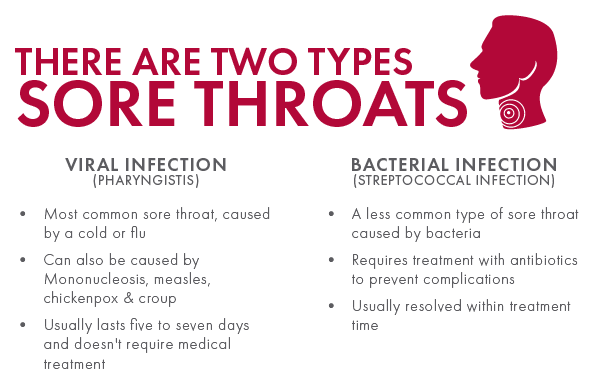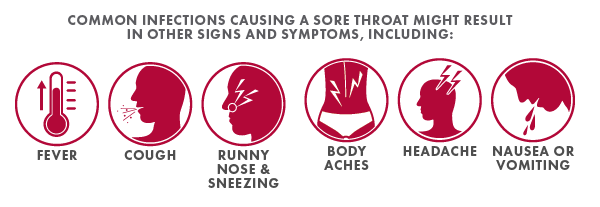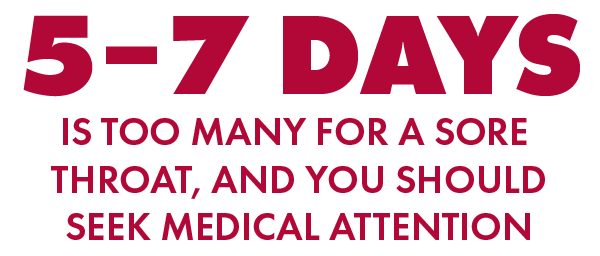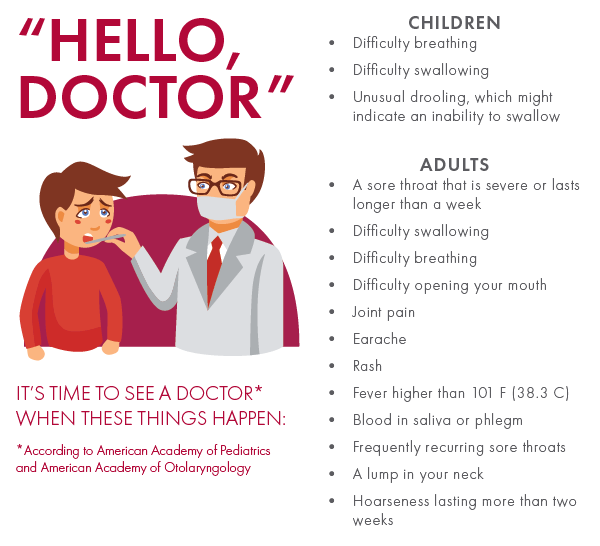If you’ve ever had a sore throat, you know it’s no fun. It’s painful and it hurts even more when you swallow. And when it goes on longer than a week, it may be strep throat and it’s time to see a doctor.
Sore Throat or Strep Throat? Viral or Bacterial?
Sore throats come in two varieties: viral and bacterial. The most common cause of a sore throat (pharyngitis) is a viral infection, such as a cold or the flu, and usually goes away on its own. A sore throat, often accompanied by fever, headache, stomachache or rash, may indicate bacterial strep throat (streptococcal infection) and requires treatment with antibiotics to prevent complications.

How Do You Feel? And Why?
Viruses cause many sore throats in both adults and children. A runny nose, cough and hoarseness are usually viral infections. Antibiotics have no effect on viral infections, but your doctor may suggest over-the-counter acetaminophen or ibuprofen and throat lozenges to alleviate the pain.
Common infections causing a sore throat might result in other signs and symptoms, including:
- Fever
- Cough
- Runny nose
- Sneezing
- Body aches
- Headache
- Nausea or vomiting

When Is It Time to See A Doctor?

It’s time to see a doctor when certain symptoms occur.
In Children
According to the American Academy of Pediatrics, you should take your child to a doctor if symptoms don’t go away with the first drink in the morning. Also, you should get immediate care if your child has severe signs such as difficulty breathing or swallowing or unusual drooling, which might indicate an inability to swallow.
In Adults
According to the American Academy of Otolaryngology, you should see your doctor if you have a sore throat and any of the following associated conditions:
- A sore throat that is severe or lasts longer than a week
- Difficulty swallowing
- Difficulty breathing
- Difficulty opening your mouth
- Joint pain
- Earache
- Rash
- Fever higher than 101 F (38.3 C)
- Blood in saliva or phlegm
- Frequently recurring sore throats
- A lump in your neck
- Hoarseness lasting more than two weeks

Make It Feel Better
For a sore throat, acetaminophen (Tylenol) or other mild pain relievers may ease pain and fever. These should be used for the shortest time possible and label directions should be followed to avoid side effects. For children, over-the-counter (OTC) pain medications designed for infants or children (Tylenol, Infant's Feverall) or ibuprofen (Pediatric Advil, Motrin Infant) can ease symptoms.
For strep throat, your doctor will prescribe antibiotics. It is important to take the full course of antibiotics as prescribed even if the symptoms are gone. Failure to take all medication as directed can result in the infection worsening or spreading to other parts of the body. Not completing the full course of antibiotics to treat strep throat can increase a child’s risk of rheumatic fever or serious kidney inflammation.
Also important: Stay home until 24 hours after starting antibiotics. You may need an EXTRA day to regain your strength!
How Not to Get a Sore Throat
Sore throat germs are spread through contact, so the best way to prevent a sore throat is to stay away from those germs and practice good hygiene. Teaching your children to do the same will keep those germs out of your house and away from your family. So, remember:
- Wash your hands thoroughly and frequently, especially after using the toilet, before eating and after sneezing or coughing.
- Avoid sharing food, drinking glasses or utensils.
- Cough or sneeze into a tissue and toss it in a receptacle that won’t come in contact with others. When necessary, sneeze into your elbow.
- Use alcohol-based hand sanitizers to washing hands when soap and water aren't available.
- Avoid touching public phones or drinking fountains with your mouth.
- Regularly clean telephones, TV remotes and computer keyboards with sanitizing cleanser. Also clean phones and remotes in your hotel room when you travel.
- Avoid close contact with people who are sick.
The Final Words for Sore Throats
A sore throat is one of the most common reasons for a sick day and a doctor’s visit. At the first sign of scratchiness, you wonder if it will linger or fade away in a few days. If it’s simply a symptom of the cold or flu, it will probably go away as your flu subsides. If it doesn’t, you’ll need to see a doctor. And the sooner you do, the sooner those antibiotics will have you saying, “Bye-bye, sore throat. You are out of here.”
Choose to Stay in Touch
Get health news, wellness tips, patient stories and more delivered to your inbox.
Sign Up Now





